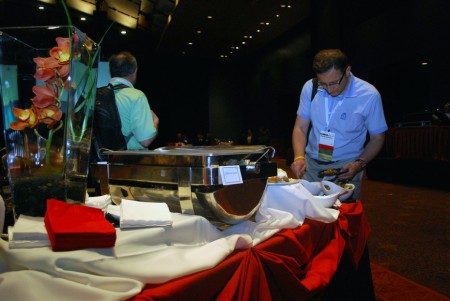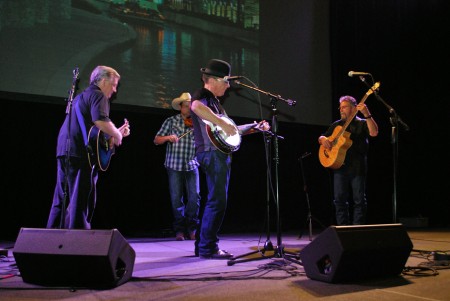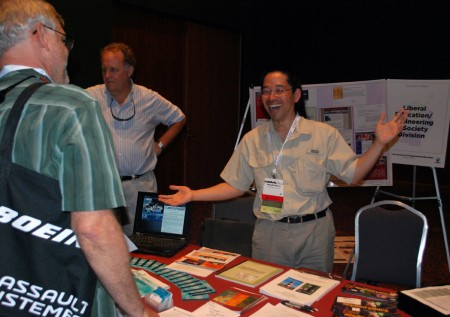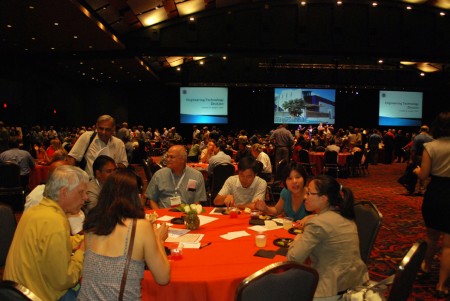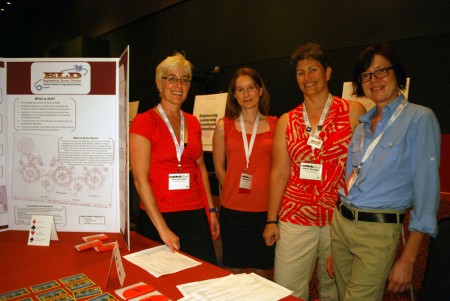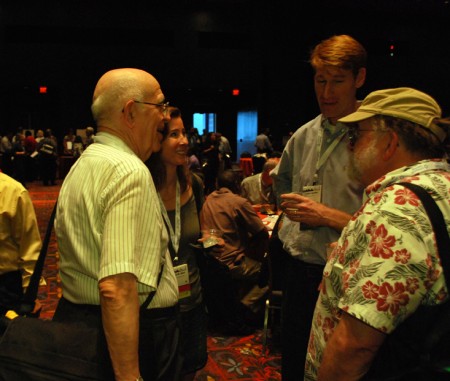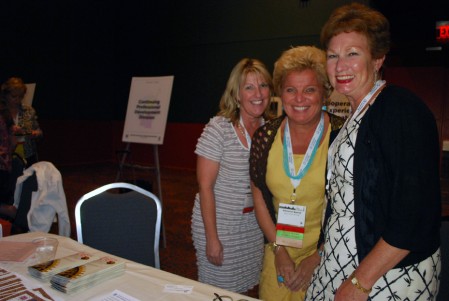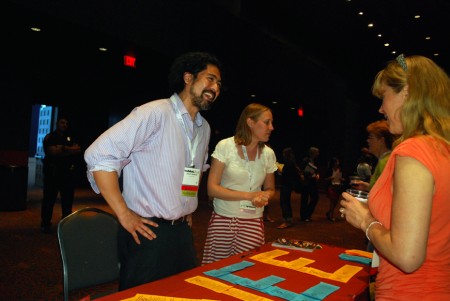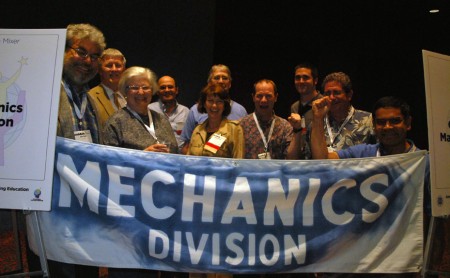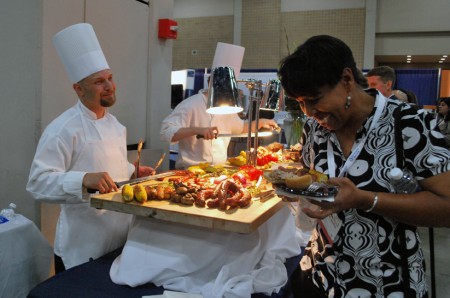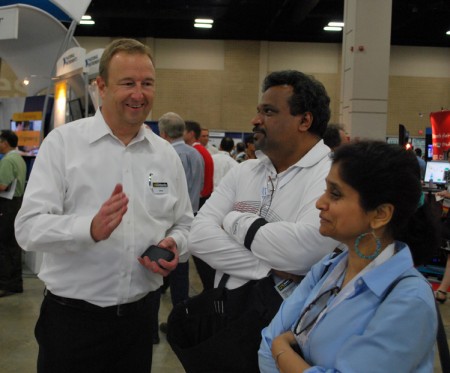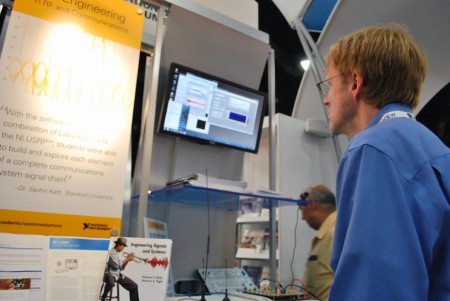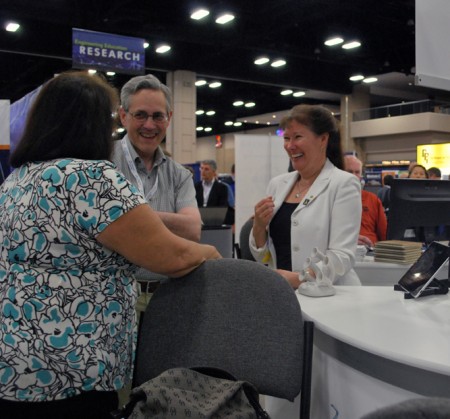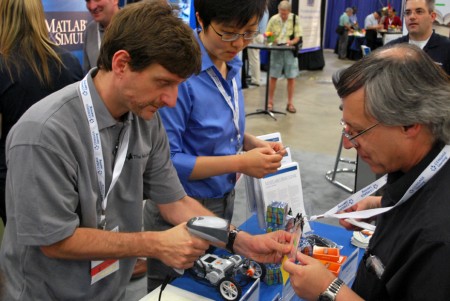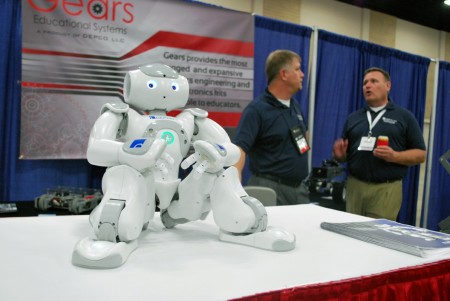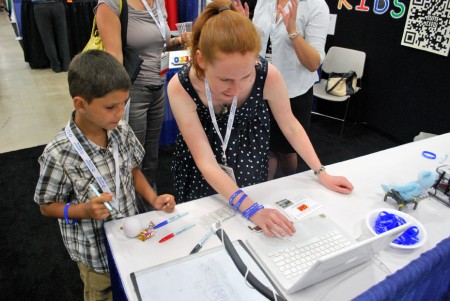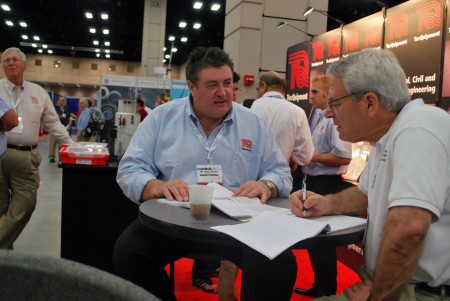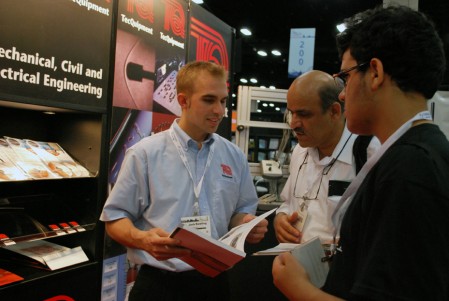ASEE’S Conference Connection –
Sunday, June 10
It’s opening day! Registration is in Exhibit Hall C from 7:00 a.m. to 6:00 p.m. The East Registration Area includes a free WiFi zone for attendees. Sunday’s highlights include workshops on virtual games to teach civil engineering concepts (with stipends for participants); From Sundials to Semiconductors, a hands-on, interdisciplinary lesson on teaching materials science and engineering via history; developing active-learning classroom exercises for use on tablet PCs (with free software); and next-generation outreach programs and assessments.
The International Forum continues through noon with several industry-led interactive sessions on global engineering education.
New to ASEE or a first-time conference attendee? Join the ASEE Board of Directors at the annual Greet the Stars Reception for newcomers, 3:00 p.m. to 4:00 p.m. New this year: the ASEE Division Mixer and Focus on Exhibits Welcome Reception. Both meet-and-mingle opportunities are free and open to all attendees.
For the titles, times, and locations of all workshops and other events, visit the online session locator. You can build an individual matrix or use a keyword search to find topics of interest.
Tweeting? Use #ASEEAnnual to share thoughts on the conference and connect. Follow @ASEEConferences for more information.
Also check out ASEE TV – a partnership with production company WebsEdge to create two daily programs, “Thought Leadership” and “Conference News,” highlighting best practices and innovations in engineering and engineering technology education.
Need tips on what to see and where to dine in San Antonio? Check out suggestions in Prism from a longtime local food writer and restaurant critic.
“Interactive” doesn’t begin to describe today’s whirl of workshops, networking opportunities, and fun! Featured sessions included using tablet PCs in active-learning classroom exercises (with free software), led by Virginia Tech electrical and computer engineering department chair Pete White, and discovering Paul Revere’s revolutionary metallurgy with Olin’s Robert Martello and Jonathan Stolk, and Lynne Silkovsky and Thomas Trice from California Polytechnic State University, San Luis Obispo.
Today’s highlights also included the annual “Greet the Stars” Orientation with ASEE’s president and other leaders for new members and first-time conference attendees, and two new events: the first annual ASEE Division Mixer and Focus on Exhibits welcome reception.
ASEE’s Division Mixer:
Exhibit Hall Welcome Reception:
What’s On Tomorrow:
Monday starts bright and early at 7;00 a.m. with panels on what’s new in ABET accreditation, novel approaches to teaching ethics (“Plumbers and Professionalism”), and predicting persistence using data on entering students and alumni.
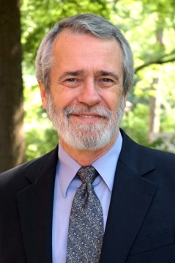 Sunday’s highlight is the much-anticipated Main Plenary and Distinguished Lecture, which kicks off the conference at 8:45 a.m. ASEE President Don Giddens will moderate a panel discussion of distinguished representatives from industry and academia on “Preparing Students for Industrial Practice.” Take a break from 10:30 a.m. to noon and see innovative products and services from industry, learn the results of dozens of NSF-supported research projects at the poster session, and join friends for a complimentary ASEE Focus on Exhibits Brunch, all in Exhibit Hall C. Cheer on first- and second-year engineering and engineering technology students as they design, build, and race autonomous robots in ASEE’s annual Model Design Competition, sponsored by the Two-Year College Division, from 10:30 a.m. to 2:30 p.m.. Then, join friends and colleagues for a complimentary treat at ASEE’s inaugural Focus on Exhibits Ice Cream Social from 3:45 p.m. to 4:15 p.m. You’ll have more opportunities to socialize this evening at the Tau Beta Pi Reception from 6:00 p.m. to 8:30 p.m., the Campus Representatives and Awards Reception from 7:00 p.m. to 9:00 p.m., and the 4th Annual Student Division Dinner from 7:00 p.m. to 10:00 p.m., co-sponsored by John Wiley & Sons, Inc.
Sunday’s highlight is the much-anticipated Main Plenary and Distinguished Lecture, which kicks off the conference at 8:45 a.m. ASEE President Don Giddens will moderate a panel discussion of distinguished representatives from industry and academia on “Preparing Students for Industrial Practice.” Take a break from 10:30 a.m. to noon and see innovative products and services from industry, learn the results of dozens of NSF-supported research projects at the poster session, and join friends for a complimentary ASEE Focus on Exhibits Brunch, all in Exhibit Hall C. Cheer on first- and second-year engineering and engineering technology students as they design, build, and race autonomous robots in ASEE’s annual Model Design Competition, sponsored by the Two-Year College Division, from 10:30 a.m. to 2:30 p.m.. Then, join friends and colleagues for a complimentary treat at ASEE’s inaugural Focus on Exhibits Ice Cream Social from 3:45 p.m. to 4:15 p.m. You’ll have more opportunities to socialize this evening at the Tau Beta Pi Reception from 6:00 p.m. to 8:30 p.m., the Campus Representatives and Awards Reception from 7:00 p.m. to 9:00 p.m., and the 4th Annual Student Division Dinner from 7:00 p.m. to 10:00 p.m., co-sponsored by John Wiley & Sons, Inc.
Notable Panels
You’re the invited speaker: To Infinity and Beyond: The ChemE of 2020, 12:30 p.m. to 2:00 p.m. in Henry B. Gonzalez Convention Center, 210A.
Bring a laptop and thumb drive and be ready to share your thoughts in five minutes or less about the knowledge, skills, and attitudes the chemical engineer of 2020 will need—and what are we doing right now to educate this person.
Tricks of the Trade for TAs, 12:30 p.m. to 2:00 p.m. in Henry B. Gonzalez Convention Center, 205.
How to motivate learners, enhance the engineering experience through participation in student organizations, and harness innovative outreach efforts that include success for STEM student-athletes.
Going Viral: Effective Instructional Techniques in an Online Environment, 4:30 p.m. to 6:00 p.m. in Henry B. Gonzalez Convention Center, 215.
Explore wikis to facilitate writing research abstracts, transforming a civil engineering curriculum through GIS integration, and other online techniques that move the instructor beyond a “talking head.”
And Don’t Miss…
What’s New in ABET Accreditation? 7:00 a.m to 8:30 a.m in room 201; Before and After: Matriculants and Alumni, 7:00 a.m. to 8:30 a.m. in room 217A; How Are We Preparing Our Students for the 21st Century Workforce? 7:00 a.m. to 8:30 a.m. in room 204A; Panel on the Project Management and Systems Engineering Education Imperative, 12:30 p.m. to 2:00 p.m. in Grand Hyatt San Antonio, Bonham D; Social Media and In-class Technology: Creating Active Learning Environments, 4:30 p.m. to 6:00 p.m. in room 210B; and The Best Zone Paper Competition, 4:30 p.m. to 6:00 p.m. in room 203A. Also: presentations by four winners of the “Best Zone Paper” competitions from the 2011 ASEE section meetings, with judges designating the “ASEE National Best Zone Paper” to receive a certificate and $1,000 cash award.
Spotlight on K-12 & Pre-College
Best Practices in K-12 Engineering: Partnerships, 12:30 p.m. to 2:00 p.m. in room 210B.
Moderator: Susan K. Donohue, University of Virginia. Learn about three unique partnerships between K-12 schools and colleges of engineering in Colorado, New Jersey, and North Carolina, one each for elementary, middle, and high school.
Out-of-School and Informal Activities, 12:30 p.m. to 2:00 p.m. in room 202A.
Afterschool programs, summer camps, and other informal opportunities play a huge role in exposing K-12 students to engineering. Discover whether such strategies increase the STEM pipeline and why.
K-12 Teachers: PD, Implementation, and Beyond, 2:15 p.m. to 3:45 p.m. in room 214D.
Moderator: Tamara J. Moore. “Teachers make lousy students and what you can do about it,” the University of Cincinnati’s presentation, is among the lively offerings assessing the fidelity of implementation of engineering in the K-12 classroom.
Examining Problem-based Learning, 4:30 p.m. to 6:00 p.m. in room 214D.
Moderator: Bette Grauer, P.E. The role of classroom artifacts and problem-based learning in a pre-service technology and engineering education course are among the issues associated with implementing inquiry in pre-college environments.
MIND, WIED, and K-12 Pre-college Engineering Reception and Awards Ceremony, 6:00 p.m. to 8:00 p.m. in Grand Hyatt San Antonio, Texas Ballroom C.
Reception for members of the K-12 & Pre-College Engineering, Women in Engineering, and Minorities in Engineering divisions.
Spotlight on Design
Capstone Design I, 7:00 a.m. to 8:30 a.m. in Grand Hyatt San Antonio, Presidio.
Learn about tracking engineering design knowledge through course milestones, developing effective assessments of engineering design, and other innovations from faculty practitioners and NSF officials.
The Teacher as Manager: Best Practices for Culminating Design Experiences, 2:15 p.m. to 3:45 p.m. in room 215.
Moderator: Ronald W. Welch, P.E. Civil engineering interdisciplinary capstone design projects and capstone consultants, from RFP to reality, are among presentations exploring the unique challenges associated with culminating design courses and effective course management approaches.
Design Spine, 4:30 p.m. to 6:00 p.m. in room 216A.
James Madison University’s innovative six-course design sequence, Rowan University’s long-term green design projects, and Pennsylvania State University’s four-year integrated design sequence in electrical engineering are among this panel’s highlights.
